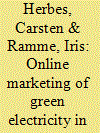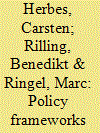|
|
|
Sort Order |
|
|
|
Items / Page
|
|
|
|
|
|
|
| Srl | Item |
| 1 |
ID:
175026


|
|
|
|
|
| Summary/Abstract |
With state-led support being only temporary, attention has turned to retail electricity markets to provide long-term support for renewable electricity. Past research has focused on consumer preferences for green electricity, i.e. the demand side. We investigated the supply side by analyzing what suppliers selling green retail electricity products in the UK, Germany, France and Italy actually provide. Through content analysis of the online data provided by these companies, we found that most products in Germany and France rely on Scandinavian hydropower. Since almost all of these plants have been operating for decades, these products today cannot be said to effectively drive new renewable capacities. Products in the UK and Italy rely on sources which already have state-led support and thus also do not drive the expansion of renewables. In fact, none of the four countries has established a policy framework that successfully fosters the development of a voluntary market for green electricity capable of driving the expansion of renewables. Alignment between sustainable energy policy objectives, consumer demand, and supply-side offerings in a voluntary market might be improved by empowering consumers through a simplified and possibly state-led labeling scheme that focuses on environmental impact and includes minimum standards for performance.
|
|
|
|
|
|
|
|
|
|
|
|
|
|
|
|
| 2 |
ID:
127906


|
|
|
|
|
| Publication |
2014.
|
| Summary/Abstract |
There is an increasing body of research on consumer preferences concerning electricity from renewable resources. The purpose of this study is to analyze how providers' online marketing in one of the most developed markets for green energy can be improved. We conducted a content analysis of nearly 480 providers' websites, examining as many as 620 products. We found that energy providers' communication seems to be in line with academic research on potential customer benefits (utilitarian benefits, "warm glow", nature experience). However, communication could be improved by giving more detailed information on the impact of the consumer's decision, e.g. by giving numbers on CO2-emissions saved. Moreover, providers could improve the effectiveness of their visual messages by using more pictures related to renewable energy. Further, self-expressive benefits of buying green energy could be created by offering merchandise articles symbolizing the contribution a consumer makes by choosing a green tariff. When comparing purely green energy providers to other providers, we found that the former offer a wider choice as well as more products supporting new renewable installations. Important implications for policy makers aiming to phase out alternative energy subsidies emerge from our findings.
|
|
|
|
|
|
|
|
|
|
|
|
|
|
|
|
| 3 |
ID:
178820


|
|
|
|
|
| Summary/Abstract |
Replacing natural gas with biomethane is an option to help decarbonize residential heating and cooling. But little biomethane is in the voluntary markets for heating. We examined biomethane-based gas tariff offerings in the UK, Germany, Austria and Switzerland, using qualitative content analysis and compared them to the national policy contexts. We find that current policies in all four countries under review clearly prioritize using biomethane for electricity generation and in transport, while leaving the heating market largely unregulated. Nonetheless, we find influence of policies on the heating market. Offerings in Germany show this influence in their biomethane content and underlying feedstock and in Austria regionality seems to be driven by grid charge regulations. If German policy makers want to channel more biomethane into residential heating, they are advised to harmonize competing support schemes for biomethane in electricity generation, transport and heating/cooling, waive mandatory CHP requirements, lower minimum biomethane content and to target existing, not just new, buildings. In the UK, the RHI should include residential buildings and using the Austrian refund system could help to develop biomethane tariffs from regional sources in Switzerland.
|
|
|
|
|
|
|
|
|
|
|
|
|
|
|
|
| 4 |
ID:
179699


|
|
|
|
|
| Summary/Abstract |
Policy makers in various countries have made the development of community energy, especially in the form of a renewable energy cooperative (REC), a goal of energy policy. Weaknesses in qualifications of REC management teams have been identified by previous research as a barrier for the further development of RECs, especially when implementation of new business models is needed. Our study is the first to examine in detail the qualifications (human capital) and networks (social capital) of REC management; our data comes from online survey responses from 187 board members of 125 RECs in Germany. We analyzed how many RECs are planning to implement new business models, finding that less than half of the surveyed RECs are planning to do so. Those REC boards that are planning new business models will require skills in sales and marketing, but REC management has qualification weaknesses and gaps in their networks precisely in these two areas. RECs could remedy these problems by bringing onboard new management team members with complementary qualifications and networks, partnering with other RECs and organizations, and training management team members. Policy makers committed to community energy can support RECs through training programs and assistance in building partnership networks.
|
|
|
|
|
|
|
|
|
|
|
|
|
|
|
|
|
|
|
|
|